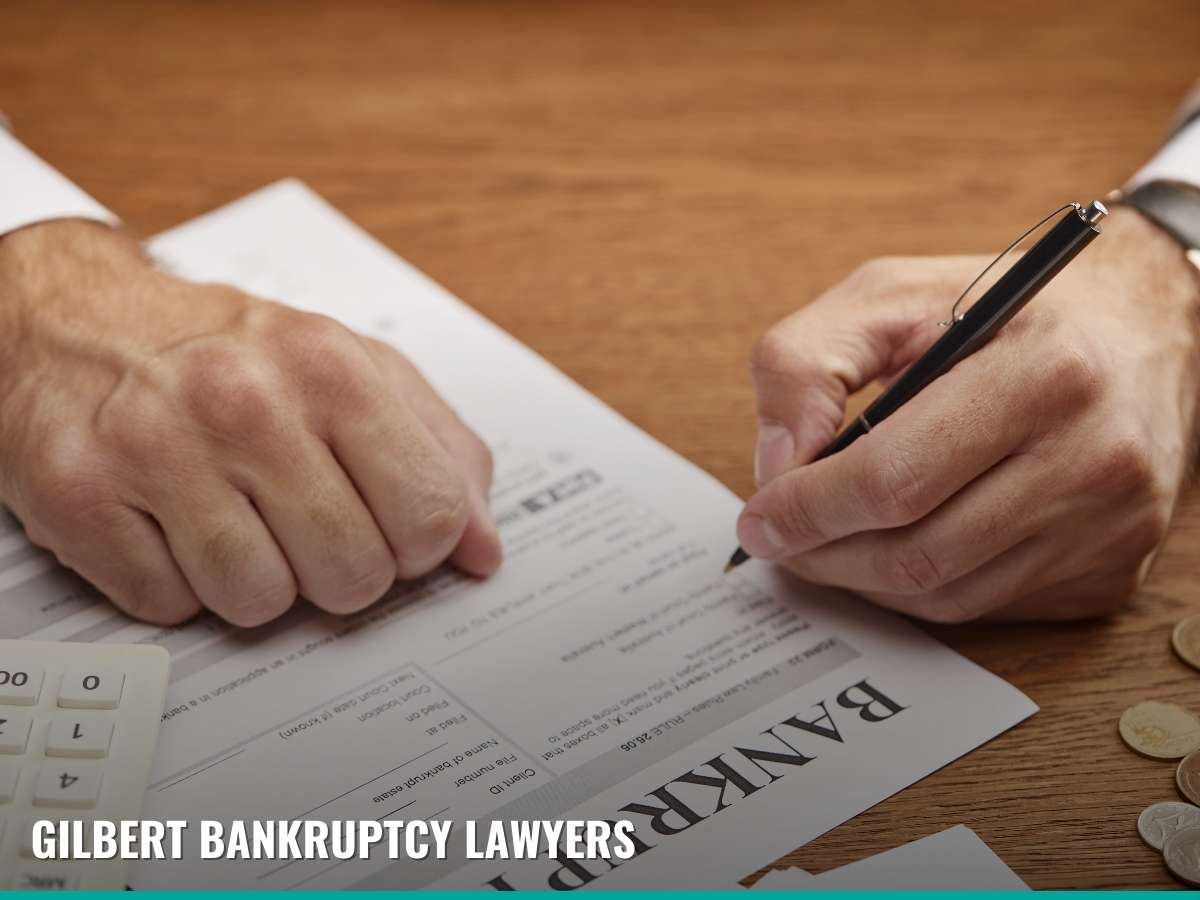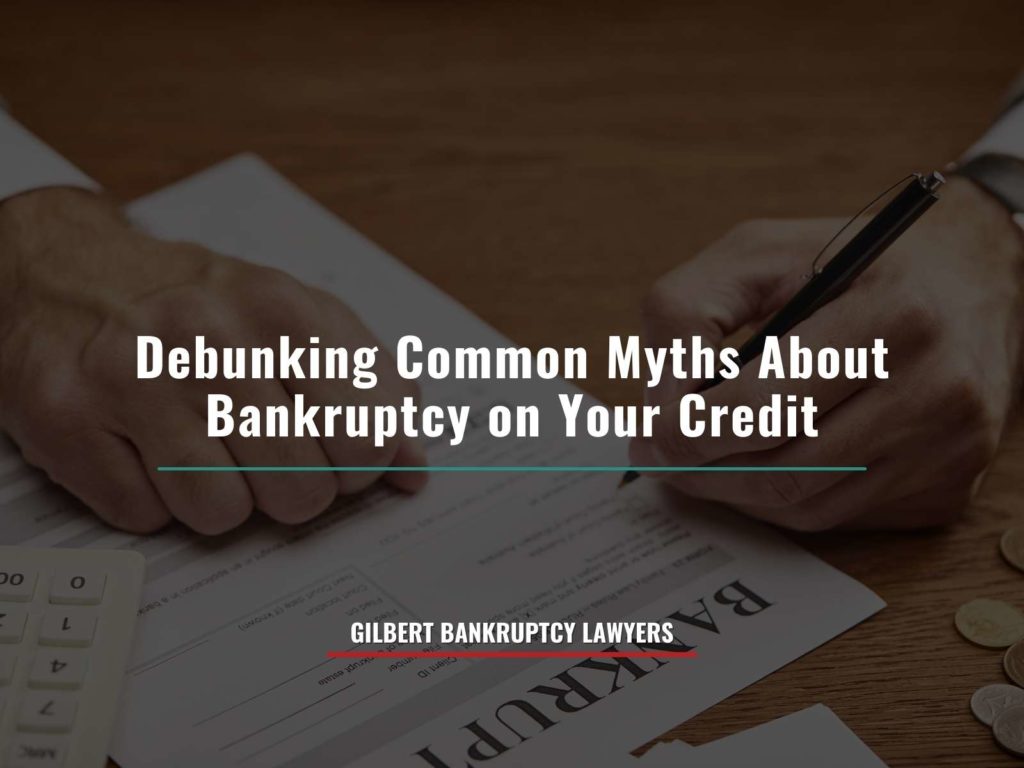Everything You Should Know If You Are Thinking About Filing For Bankruptcy
Filing bankruptcy will have significant effects on your credit and can cause your credit score to drop as many as 200 points or more. However, sometimes bankruptcy can be a last resort option that helps people in difficult situations liquidate their assets, pay off or settle their debts, and gain relief from financial troubles. If you’re thinking about filing for bankruptcy, take a look at these common myths debunked by a trusted Gilbert bankruptcy lawyer.

Myth: If you have a great credit score and no negatives on your credit report before you file bankruptcy, you’ll have a higher credit score after filing bankruptcy than you would if you had negative information before filing.
Truth: A history of making on time payments and lack of negative information does not significantly minimize the impact of a Gilbert Chapter 7 bankruptcy on your credit score. Instead, the presence of a bankruptcy and how long the bankruptcy has been on your report are the strongest factors determining your credit score after filing.
Myth: A bankruptcy will stay on your credit report for 10 years, with no exceptions.
Truth: Only the public records from a Gilbert Chapter 7 bankruptcy will remain on a credit report for 10 years. All other bankruptcy references will be only your credit report for just seven years. This includes:
- Trade lines that indicate your account included in bankruptcy
- Third-party collection debts, judgments, and tax liens that were discharged through your bankruptcy filing
- Gilbert Chapter 13 bankruptcy public records
As these begin to disappear from your credit report, it’s likely you’ll start to see larger boosts in your credit score.
Myth: As long as the bankruptcy stays on your credit report, you will have bad credit.
Truth: While you can expect a much lower credit score following your bankruptcy filing, smart credit management can help you build up your credit. Within 4-5 years, you may even be able to get into the 700 range. Once you’ve filed bankruptcy with a Gilbert bankruptcy attorney, you can immediately begin working on building up your credit with the following options:
- Adding new credit such as a secured credit card or small installment loan
- Making all of your payments on time, including rent, new debt, or Chapter 13 bankruptcy payments
- Using less than 30% of your available credit card balance
Myth: Filing for bankruptcy affects the credit of everyone equally, regardless of how much debt or how many loans were included.
Truth: Your credit score will consider details such as how much debt was discharged and the proportion of negative and positive accounts that you hold. If you had a relatively low amount of debt and/or only a couple of accounts in your bankruptcy filing, your credit score will likely be higher than someone who had a more severe bankruptcy.
Myth: All debts discharged by filing bankruptcy will disappear from your credit report.
Truth: While filing bankruptcy with an experienced Gilbert bankruptcy law office will help erase or settle your debts, those accounts will still remain on your credit report and affect your credit score for 7-10 years, depending on which type of bankruptcy you choose. However, the impact on your credit score will decrease over time. Federal student loans usually cannot be discharged by filing bankruptcy, so you may still be required to make payments on them.
Myth: After filing bankruptcy, you won’t qualify for a credit card or a loan.
Truth: Since credit cards are one of the best ways to build credit, it’s good to know that there are options for people with a challenging credit history. Secured credit cards, which require a security deposit, may be a good option and help build credit just like a traditional credit card. People who have filed for bankruptcy may also qualify for loans such as passbook, CD, or credit builder loans, that require collateral or a deposit. All of these will help build your credit as you pay them off, and are much easier to get because the lender is protected with your initial deposit.
Myth: Filing for bankruptcy will ruin your credit forever.
Truth: Filing for bankruptcy will severely damage your credit in the short term, but is only on your credit report for up to 10 years. After those 7-10 years, you’re free and clear. If you are able to establish good financial habits and build up your credit in the meantime, you may end up with stronger credit than ever.
Before you take the leap and file for bankruptcy, consult with a trusted Gilbert bankruptcy lawyer who can help you understand the facts about bankruptcy and credit scores. Good legal advice can help minimize the damage and give you a jump start on re-establishing your credit after you’ve filed.
Learn More with Gilbert’s Most Trusted Bankruptcy Law Firm
Put an end to burdensome debt and gain a fresh start when you work with the experienced team at Gilbert Bankruptcy Lawyers. Our zero money down program gives you the opportunity to get legal advice and make debt relief your reality without struggling to find the money to get started with a bankruptcy attorney. Eliminate your debt by scheduling your free consultation with one of our bankruptcy lawyers today!
Gilbert Bankruptcy Lawyers
Office: 480-448-9800
Email: info@myazlawyers.com
Website: https://gilbertbankruptcylawyers.com
